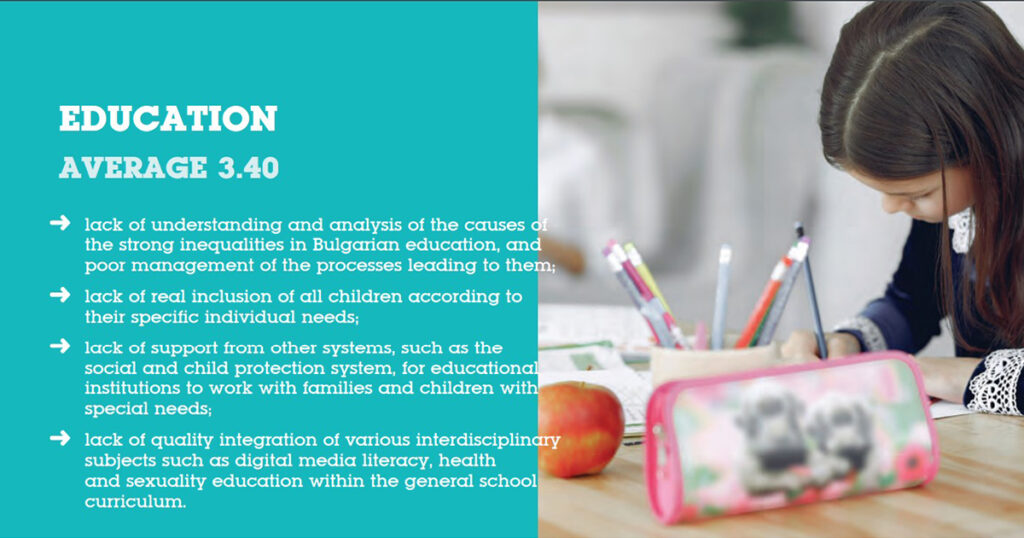Published by: RCISD
26.06.2023
News
“Report Card 2023: What Is the Average Government Score for Childcare” is the twelfth edition of National Network for Children’s (NNC) annual report. The National Network for Children is an alliance of civil society organisations and supporters, working with and for the children and families across the whole country.
The report assesses the compliance with children’s rights in the implementation of national child and family policies in 2022. Its main purpose is to carry out annual and independent evidence-based monitoring of the work of the government in the field of child rights.
Scoring in the report is equivalent to the one used in the Bulgarian educational system, and is based on a scale of two to six. The assessments were originally made by our experts and external evaluators, along with the children, parents and professionals, and were then verified by the civil organisations participating in the National Network for Children. The final grades are based on the arithmetic averages of the grades given by the authors and external evaluators and the children, parents and professionals in each sub-area under the eight subject areas covered by the report.
The document further provides recommendations, which will support the improvement of child and family policies and practices in Bulgaria.
Here are some highlights of the report’s findings regarding the education system in the country:
The rating in the Education section is Average 3.40
“In the Bulgarian education system, there is a significant disparity – there are brilliant Olympians from specific schools and poor performance in general education for 40% of children. There are no policies addressing regional differences. Ideas for military education are being discussed instead of working with parents and educational mediators. The school, as a place that usually first identifies children’s problems outside the family, fails to become a trusted environment that provides support for stress, acts of violence, etc.
Inclusive education does not happen because it is delegated to the mass teacher, there are no inclusive models, and teachers do not know how to work with them, and even admission is refused in kindergartens. Among all the existing problems, important topics such as media literacy, safe internet use, civic education, sexual education, etc., are pushed to the background. They are not addressed at all and remain neglected. Overall, the system gives the impression that there is funding for education, but it is not being spent wisely and does not contribute to the effectiveness, sustainability, and return on investment.
…
Educational differences and segregation are becoming deeper, and children’s success in school is directly linked to their place of residence and the socio-economic status of their families. Due to “hidden” educational expenses (materials, food, transportation), access and full participation of children in the educational process are actually limited by the families’ capabilities. In early 2023, changes were introduced making textbooks free for grades 1 to 12, which is certainly a step forward, but the disparity in the level of preparation and access quality exists at all levels. According to data from the Institute for Market Economics, 7th graders in 181 municipalities have a Weak (2) level in mathematics – in nearly 70% of municipalities. This indicates a significant concentration of quality education in mathematics (and exact sciences in general) in a very small number of elite schools. Outside of those schools, the quality sharply declines, resulting in fewer students being able to continue their education in directions that require more serious preparation. From an economic development perspective, this circumstance hinders the potential development of numerous industries and condemns entire regions to long-term shortages of skilled workers.
…
Municipalities are not effectively implementing (or not implementing at all) desegregation policies. The Ministry of Education even halted the national program for appointing educational mediators, which undermines the previously successful practices of supporting vulnerable groups, especially in schools with diverse ethnic compositions and small schools. It is alarming to see the Ministry of Education’s apparent reluctance to engage with topics such as the integration of children with disabilities in Bulgaria.
…
In the inclusive education domain, the Ministry of Education demonstrates willingness to support children and students with special educational needs (SEN) through participation in various projects and national programs. However, the prescribed standards for adapting content, individual educational programs, and vocational training based on disabilities are followed only formally, and there is no tracking of outcomes. There are also inadequate mechanisms to guarantee the right of students with SEN to access quality vocational training, which diminishes their chances of succeeding in the labor market.”

You can access the full report here.
Published by: RCISD
26.06.2023